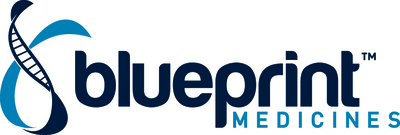Blueprint Medicines Data Highlight Clinical Leadership in Systemic Mastocytosis at AACR Annual Meeting 2021
"Data reported at AACR reflect our commitment to transform treatment for patients living with systemic mastocytosis," said
AYVAKIT – Highlights from the Registrational Phase 2 PATHFINDER Trial
In a pre-specified interim analysis from the PATHFINDER trial, 32 patients who primarily received a starting dose of 200 mg once daily were evaluable for response, as of a data cutoff date of
AYVAKIT led to robust and durable benefits across a number of additional clinical activity measures. In new patient-reported outcomes data, AYVAKIT showed a statistically significant reduction in total symptom score after 40 weeks (p<0.001), as measured by the Advanced Systemic Mastocytosis Symptom Assessment Form. Treatment with AYVAKIT resulted in robust improvements in patient-reported quality of life, based on the
Consistent with previously disclosed data, AYVAKIT was generally well-tolerated in 62 patients enrolled in the PATHFINDER trial, and most adverse events (AEs) were reported as Grade 1 or 2. The most common AEs (≥15 percent) were peripheral edema, periorbital edema, thrombocytopenia, anemia, neutropenia, diarrhea, nausea, vomiting and fatigue. Three patients (5 percent) discontinued AYVAKIT due to treatment-related AEs, and most patients (84 percent) have remained on treatment as of the data cutoff date.
"These data reinforce the potential of avapritinib to improve the standard of care for patients with advanced systemic mastocytosis, a disease characterized by organ damage due to mast cell infiltration," said
AYVAKIT – Statistically Significant Reductions of Aberrant CD30-Positive Mast Cells in Skin Lesions Shown in Phase 2 PIONEER Trial
In non-advanced SM, skin symptoms frequently persist and can severely impact quality of life. To assess the effects of AYVAKIT on mast cell burden in skin lesions, skin biopsies were obtained at baseline and week 12 in Part 1 of the PIONEER trial. Immunohistochemistry tests were performed to determine the proportion of aberrant mast cells in skin tissue, based on expression of CD25, CD30 and other transmembrane receptors observed in SM. Skin lesional tissue at baseline had more CD30-positive than CD25-positive mast cells. Following 12 weeks of treatment, AYVAKIT significantly reduced the proportion of aberrant CD30-positive mast cells in skin lesions compared to placebo (p=0.0082), as of a data cutoff date of
BLU-263 – Safety and Pharmacokinetics Profile from Phase 1 Trial in
A placebo-controlled, Phase 1 trial evaluated the safety, tolerability and pharmacokinetics of BLU-263 in healthy volunteers. This AACR presentation reported on single ascending dose cohorts (15 to 200 mg doses) and multiple ascending dose cohorts (25 to 100 mg once-daily doses for ten consecutive days), as of a data cutoff date of
Copies of
Conference Call Information
About SM
SM is a rare disease driven by the KIT D816V mutation. Uncontrolled proliferation and activation of mast cells result in chronic, severe and often unpredictable symptoms for patients across the spectrum of SM. The vast majority of those affected have non-advanced (indolent or smoldering) SM, with debilitating symptoms that lead to a profound, negative impact on quality of life. A minority of patients have advanced SM, which encompasses a group of high-risk SM subtypes including aggressive SM, SM with an associated hematological neoplasm and mast cell leukemia. In addition to mast cell activation symptoms, advanced SM is associated with organ damage due to mast cell infiltration and poor survival.
Debilitating symptoms, including anaphylaxis, maculopapular rash, pruritis, diarrhea, brain fog, fatigue and bone pain, often persist across all forms of SM despite treatment with a number of symptomatic therapies. Patients often live in fear of severe, unexpected symptoms, have limited ability to work or perform daily activities, and isolate themselves to protect against unpredictable triggers. Currently, there are no approved therapies for the treatment of SM that selectively inhibit D816V mutant KIT.
About AYVAKIT (avapritinib)
AYVAKIT (avapritinib) is a kinase inhibitor approved by the
AYVAKIT/AYVAKYT is not approved for the treatment of any other indication, including SM, in the
To learn about ongoing or planned clinical trials, contact
About BLU-263
BLU-263, a next-generation KIT D816V inhibitor, has the potential to expand the reach of KIT D816V-targeted therapy to a broad population of patients with non-advanced SM and related mast cell disorders. BLU-263 was designed to target D816V mutant KIT with similar sub-nanomolar potency as AYVAKIT, enhanced selectivity and minimal central nervous system penetration. BLU-263 was developed based on learnings from the AYVAKIT clinical program. The initial focus of the BLU-263 development program is non-advanced SM.
About Blueprint Medicines
Cautionary Note Regarding Forward-Looking Statements
This press release contains forward-looking statements within the meaning of the Private Securities Litigation Reform Act of 1995, as amended, including, without limitation, statements regarding plans, timelines and expectations for interactions with the FDA and other regulatory authorities; the plans, timing, designs, implementation, enrollment and announcement of results regarding
Trademarks
![]() View original content to download multimedia:http://www.prnewswire.com/news-releases/blueprint-medicines-data-highlight-clinical-leadership-in-systemic-mastocytosis-at-aacr-annual-meeting-2021-301266178.html
View original content to download multimedia:http://www.prnewswire.com/news-releases/blueprint-medicines-data-highlight-clinical-leadership-in-systemic-mastocytosis-at-aacr-annual-meeting-2021-301266178.html
SOURCE
Andrew Law, 617-844-8205, media@blueprintmedicines.com; Investor Relations Contact, Kristin Hodous, 617-714-6674, ir@blueprintmedicines.com

